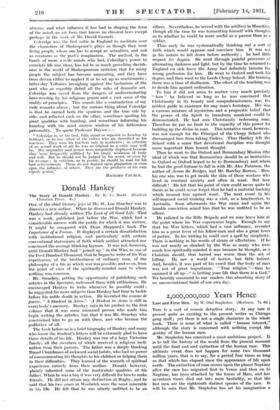Donald Hankey
The Story of Donald Hankey. By K. G. Budd. (Student Christian Press. 48.) ONE of the chief literary joys of Mr. St. Loe Strachey was to discover a new author. When he discovered Donald Hankey, Hankey had already written The Lord of all Good Life. That was a work, published just before the War, which had a considerable success with the public for which it was written, It might be compared with Dean Sheppard's book The Impatience of a Parson. It displayed a certain dissatisfaction with institutional religion, and particularly with certain conventional statements of faith which neither attracted nor convinced the average thinking layman. It was not, however, until Donald Hankey had " joined up " in the War, as one of the First Hundred Thousand, that he began to write of his War experiences, of the brotherliness of ordinary men, of the philosophy of a life in which war was possible, and so on, from the point of view of the spiritually-minded man to whom nothing was common.
Mr. Strachey, getting the opportunity of publishing such articles in the Spectator, welcomed.them with enthusiasm. He encouraged Hankey to write whenever he possibly could ; he suggested far more subjects than Hankey had time to tackle before his noble death in action. He invented the nomme de guerre, " A Student in Arms." A Student in Arms is still in everybody's memory. Hankey says in his preface to the first volume that it was some unnamed person who made him begin writing the articles, but that it was Mr. Strachey who constrained him to go on with them, and who became the godfather of all.
The book before us is a brief biography of Hankey and many who know the Student's letters will be extremely glad to have these details of his life. Hankey was one of a large Victorian family, all the members of which received a religious incli- nation from their parents. The father was a deeply thinking Broad Churchman of awkward social habits, who had no power of communicating his thoughts to his children or helping them in their difficulties. They learned of the warmth of spiritual experience entirely from their mother. Donald, however, plainly inherited some of the inarticulate qualities of his father. N'Vhen he was a boy it was very difficult for him to make friends. He did not attain any distinction at Rugby, and he said that his two years at Woolwich were the most miserable in his life. He felt that he was utterly unfitted to be an
officer. Nevertheless, he served with the artillery in Mauritius, though all the time he was tormenting himself with thoughts as to whether he could be more useful as a parson than as a soldier.
Thus early he was systematically thinking out a sort of faith which would appease and convince him. It was not in his nature to fall down before authority ; he had little respect for dogma. He went through painful processes of alternating darkness and light, but by the time he returned to England on sick leave the Army had definitely become the wrong profession for him. He went to Oxford and took his degree, and then went to the Leeds Clergy School. His training there was a time of disillusion. The effect of the teaching was to decide him against ordination.
To him it did not seem to matter very much precisely " how " he believed so long as he was convinced that Christianity in its beauty and comprehensiveness was the noblest guide in existence for any man's footsteps. His was a curious mixture of mysticism and a pragmatic belief that the power of the Spirit to transform mankind could be demonstrated. He had seen Christianity redeeming man. Therefore he put no limit to the capacity of this power for building up the divine in man. This tentative creed, however, was not enough for the Principal of the Clergy School who discouraged him from taking Orders.. Thus Hankey left the School with a sense that devotional discipline was thought more important than honest thought.
Then he went to the Oxford and Bermondsey Mission (the ideal of which was that Bermondsey should be as instructive to Oxford as Oxford hoped to be to Bermondsey) and where he had the good fortune to fall in with Mr. Alec Paterson, the author of Across the Bridges, and Mr. Barclay Barron. Here his one aim was to get inside the skin of those workers who lived in constant anxiety and often in want. But how difficult ! He felt that his point of view could never quite be theirs as he could never forget that he had a material backing which insured him against want. The next event in his self-imposed social training was a visit, as a handworker, to Australia. Soon afterwards the War came and again the humble conviction seized him that he was unfitted to be an officer.
He enlisted in the Rifle Brigade and we may leave him at the point where his War experiences begin. Enough to say that his War letters, which had a vast influence, revealed him as a great lover of his fellow-men and also a great lover of justice. In his writing he could east a spell by simplicity. There is nothing in his words of strain or affectation. If he was not nearly so shocked by the War as many who were much less spiritually-minded it was because he thought, as a Christian should, that hatred was worse than the act of killing. He saw a world of horror, but little hatred. And, besides, it was part of his creed that the body of man was not of great importance. " True religion "—thus he summed it all up—" is betting your life that there is a God." We heartily commend to our readers this absorbing story of an unconventional Saint of our own day.















































 Previous page
Previous page